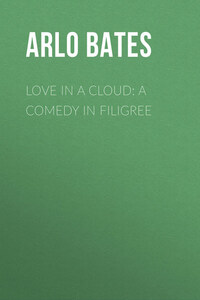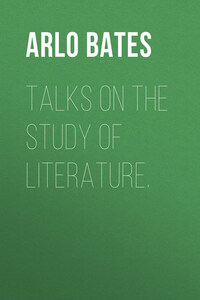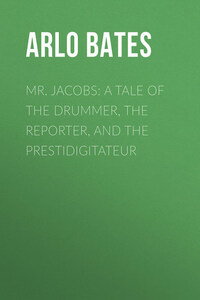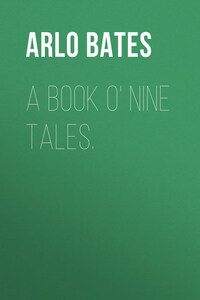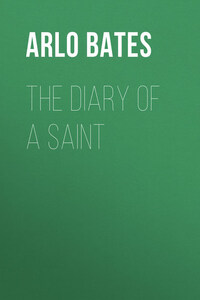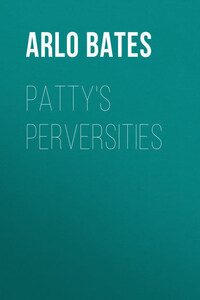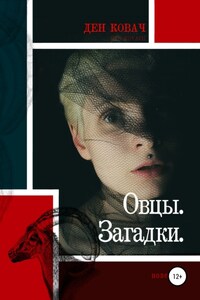"No, my dear May, I positively will not hear another word about 'Love in a Cloud.' I am tired to death of the very sound of its stupid name."
"Oh, Mrs. Harbinger," May Calthorpe responded, eagerly defensive, "it isn't a stupid name."
Mrs. Harbinger settled herself back into the pile of gay cushions in the corner of the sofa, and went on without heeding the interruption: —
"I have heard nothing but 'Love in a Cloud,' 'Love in a Cloud,' until it gives me a feeling of nausea. Nobody talks of anything else."
May nodded her head triumphantly, a bright sparkle in her brown eyes.
"That only shows what a perfectly lovely book it is," she declared.
Mrs. Harbinger laughed, and bent forward to arrange a ribbon at May's throat.
"I don't care if it is the loveliest book ever written," she responded; "I won't have it stuffed down my throat morning, noon, and night. Why, if you'll believe it, my husband, who never reads novels, not only read it, but actually kept awake over it, and after that feat he'll talk of it for months."
Pretty May Calthorpe leaned forward with more animation than the mere discussion of an anonymous novel seemed to call for, and caught one of her hostess's hands in both her own.
"Oh, did Mr. Harbinger like it?" she asked. "I am so interested to know what he thinks of it."
"You never will know from me, my dear," was the cool response. "I've forbidden him to speak of it. I tell you that I am bored to death with the old thing."
May started up suddenly from the sofa where she had been sitting beside Mrs. Harbinger. With rather an offended air she crossed to the fireplace, and began to arrange her hat before the mirror over the mantel. Mrs. Harbinger, smiling to herself, gave her attention to setting in order the cups on the tea-table before her. The sun of the April afternoon came in through the window, and from the polished floor of the drawing-room was reflected in bright patches on the ceiling; the brightness seemed to gather about the young, girlish face which looked out from the glass, with red lips and willful brown hair in tendrils over the white forehead. Yet as she faced her reflection, May pouted and put on the look of one aggrieved.
"I am sorry I mentioned the book if you are so dreadfully against it," she observed stiffly. "I was only going to tell you a secret about the author."
Mrs. Harbinger laughed lightly, flashing a comical grimace at her visitor's back.
"There you go again, like everybody else! Do you suppose, May, that there is anybody I know who hasn't told me a secret about the author? Why, I'm in the confidence of at least six persons who cannot deny that they wrote it."
May whirled around swiftly, leaving her reflection so suddenly that it, offended, as quickly turned its back on her.
"Who are they?" she demanded.
"Well," the other answered quizzically, "Mrs. Croydon, for one."
"Mrs. Croydon! Why, nobody could dream that she wrote it!"
"But they do. It must have been written by some one that is inside the social ring; and there is a good deal in the style that is like her other books. I do wish," she went on, with a note of vexation in her voice, "that Graham would ever forget to mix up my two tea-services. He is a perfect genius for forgetting anything he ought to remember."
She walked, as she spoke, to the bell, and as she passed May the girl sprang impulsively toward her, catching both her hands.
"Oh, Mrs. Harbinger!" she cried breathlessly. "I must tell you something before anybody comes."
"Good gracious, May, what is it now? You are as impulsive as a pair of bellows that could blow themselves."
The butler came ponderously in, in reply to her ring as she spoke, and the two women for the moment suspended all sign of emotion.
"Graham," Mrs. Harbinger said, with the air of one long suffering and well-nigh at the end of her patience, "you have mixed the teacups again. Take out the tray, and bring in the cups with the broad gold band."
Graham took up the tray and departed, his back radiating protest until the portière dropped behind him. When he was gone Mrs. Harbinger drew May down to a seat on the sofa, and looked at her steadily.
"You evidently have really something to tell," she said; "and I have an idea that it's mischief. Out with it."
May drew back with heightened color.
"Oh, I don't dare to tell you!" she exclaimed.
"Is it so bad as that?"
"Oh, it isn't bad, only – Oh, I don't know what in the world you will think!"
"No matter what I think. I shan't tell you, my dear. No woman ever does that."
May regarded her with a mixture of curiosity and wistfulness in her look.
"You are talking that way just to give me courage," she said.
"Well, then," the other returned, laughing, "take courage, and tell me. What have you been doing?"
"Only writing letters."
"Only! Good gracious, May! writing letters may be worse than firing dynamite bombs. Women's letters are apt to be double-back-action infernal-machines; and girls' letters are a hundred times worse. Whom did you write to?"
"To the author of 'Love in a Cloud.'"
